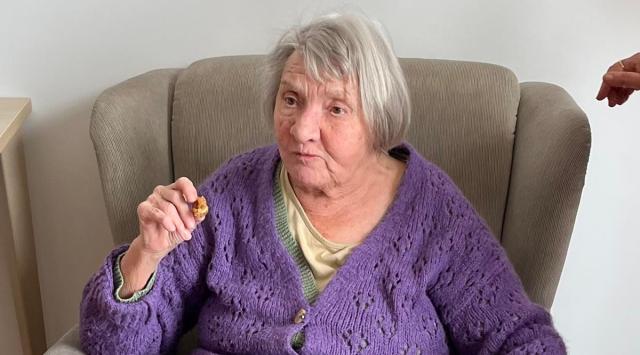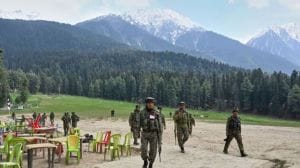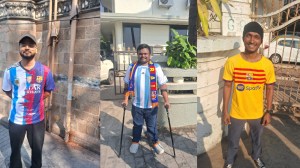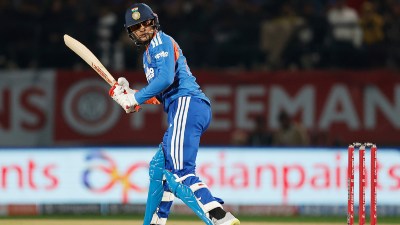Click here to join Express Pune WhatsApp channel and get a curated list of our stories
Pune recalls association with Maria Mies, German sociologist and ecofeminist who died at 92
For Dr Datar who has been closely associated with Mies, it was like a flashback when she was flooded with several memories about her dear friend, right from the time Sarkar first met Mies as a student at the Goethe-Institut/Max Mueller Bhavan in Pune where he was learning German to the time she was in Cologne, Germany celebrating the ecofeminist’s 70th birthday.
 German sociologist and ecofeminist Maria Mies. (Express Photo)
German sociologist and ecofeminist Maria Mies. (Express Photo) Late on Tuesday evening, Dr Chhaya Datar, 80, former head of the Women Studies Unit at the Tata Institute of Social Sciences, Mumbai, got a mail from noted writer Saral Sarkar informing her about the passing away of his wife Maria Mies, 92, an eminent sociologist and internationally well-known feminist.
“I am writing to you in deep sorrow and with tearful eyes: Maria has passed away… She died in her sleep. I visited her once every day at the care home. At first, she recognised me and was glad to see me. But later no longer,” wrote Sarkar, a writer and former activist.
For Dr Datar who has been closely associated with Mies, it was like a flashback when she was flooded with several memories about her dear friend, right from the time Sarkar first met Mies as a student at the Goethe-Institut/Max Mueller Bhavan in Pune where he was learning German to the time she was in Cologne, Germany celebrating the ecofeminist’s 70th birthday.
In 1963, Mies was a lecturer at the Goethe-Institut in Pune where she had undertaken research on the dilemmas and conflicts of modern middle-class women. This German professor and Marxist feminist was teaching German at the institute and Sarkar who was then an activist in the Far-Left movement was her student.
“He was of course younger but I distinctly remember that is where they had first met and then over the years they moved abroad. She suffered from dementia and was in a care home. Saral would visit her regularly,” recalled Dr Datar who was a student of the first batch of women’s studies course that was designed by Mies at the International Institute of Social Studies, The Hague, Netherlands.
“The institute was recruiting several students from third world countries – then in the early 1980s – and she had suggested my name,” Datar added.
“Maria was interested in knowing more about rural life and I had taken her to Shahada town in Nandurbar district of Maharashtra where she interacted with several Adivasi women to know about how they organised themselves to fight for their land,” Datar said.
“Over the years, we stayed connected with each other and whenever I travelled to the USA, I would halt at Cologne, Germany. I stayed with her for 15 days and was there for her 70th birthday party,” she recalled. Dr Datar was instrumental in instituting an award in the name of Prof Maria Mies for the MA course in Women’s Studies at TISS.
Dr Vibhuti Patel, former professor of economics at SNDT Women’s University, Mumbai, and currently vice-president of the Indian Association for Women’s Studies, remembered how Mies would introduce herself as a “Bengali bahu”. She had married Sarkar by then.
“We got to know of her when she did a very important study on lace makers of Narsapur (Andhra Pradesh) at the time when the International Labour Organisation had come up with women, work and development series in the late 1970s-80s. She was an established academician and was extremely interested in research on women’s role in economic development and how unpaid work benefitted capitalist systems,” Patel said.
“During the late 1970s till 1990, we used to meet and interact with Prof Maria Mies regularly in the workshops, study circles, consultations, conferences and meetings of the Feminist International Network on Reproductive Rights and Against Genetic Engineering (FINRRAGE) in Pune or Mumbai or Hyderabad. Maria Mies wholeheartedly supported our campaign against sex selection and alerted us about the harmful impact of new reproductive technologies. Her writings and quotable quotes, ‘coloured women as a last colony for capital accumulation’ and ‘invisible hands’, have been cited by us in our lectures, training programmes and study circles,” Patel said and referred to her landmark study on the lacemakers of Narsapur (Andhra Pradesh) wherein she had argued that ideological views often coincide with economic systems.
“She was full of enthusiasm and when she spoke she electrified the environment. We got the inspiration to work on environmental issues with a gender lens. Meeting with her always boosted our confidence when the scientific community was alleging us to be anti-science because we were campaigning against harmful contraceptives and new reproductive technologies used for femicide,” Patel recalled.
As women’s groups mourned the loss of the noted “eco-feminist” who was active in various social movements, Dr Vandana Shiva, the physicist and social activist who co-authored a book with Mies, said: “Maria was a very dear friend. We wrote ‘Ecofeminism’ together, and our thinking was in deep resonance. In 1995, at the UN Leipzig conference on Plant Genetic resources, we were present together and wrote the Leipzig appeal. In 1996 at the UN Food Summit, we launched the call for food sovereignty in women’s hands and collected 1,00,000 signatures. Maria will continue to live through her ideas, her activism, and our friendship.”
Click here to join Express Pune WhatsApp channel and get a curated list of our stories








